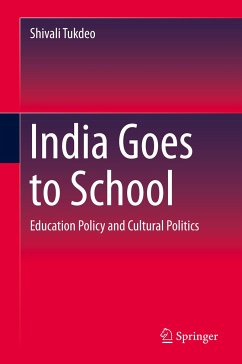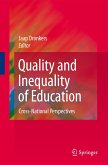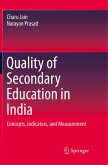This book pays attention to education in India as part of several overlapping stories developed along different axes: stories of dissent, contestations, appropriation and social action. It historicises the enterprise of formal education by paying attention to the numerous policy shifts. Further, it theorises the education policy discourse by analysing the ways in which education is increasingly being shaped by international/transnational knowledge production, actors and norms. Focusing on the cultural politics of education policy production, circulation and translation across different contexts, the book revisits some of the long-standing and unresolved debates on social reforms, justice, nationalism and mobility. Evolution of ideas such as mass education, national education, adult literacy and education through public-private-partnerships showcase the momentous shifts in education policy over the course of last century. Ideas, institutional and economic arrangements, administrative formulations and frameworks for implementation make frequent appearances in the cultural as well as political reading of education policy. In a departure from the traditional policy research, this work sees policy as socially and culturally constructed; connected to questions of power, context and struggle; and part of a number of processes at large.
"The book is a must-read for students and scholars to comprehend the subtle nuances of educational policy frameworks in the Indian context and to enrich their understanding about the changing discourses about caste, gender, class, power, patriarchy, bureaucracy and educational outcomes. ... this book offers timely and relevant insights to understand the rationale and relevance of policymaking from varied dimensions." (Bilal Kaloo, Contemporary Education Dialogue, Vol. 18 (1), 2021)
"What makes this book riveting is Tukdeo's view of policy as socially and culturally constructed. She draws on feminist, post-colonial and anti-caste literature to critique policy frameworks ... . Her book examines the intellectual hegemony inherent in the specific targets set up by Education for All, and the generic standards laid down in the Millennium Development Goals. ... It invites the reader to think about how education policy is a tool for creating consensus around ideas of citizenship." (Chintan Girish Modi, Business Standard, February 20, 2020)
"What makes this book riveting is Tukdeo's view of policy as socially and culturally constructed. She draws on feminist, post-colonial and anti-caste literature to critique policy frameworks ... . Her book examines the intellectual hegemony inherent in the specific targets set up by Education for All, and the generic standards laid down in the Millennium Development Goals. ... It invites the reader to think about how education policy is a tool for creating consensus around ideas of citizenship." (Chintan Girish Modi, Business Standard, February 20, 2020)








